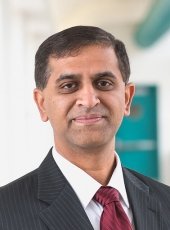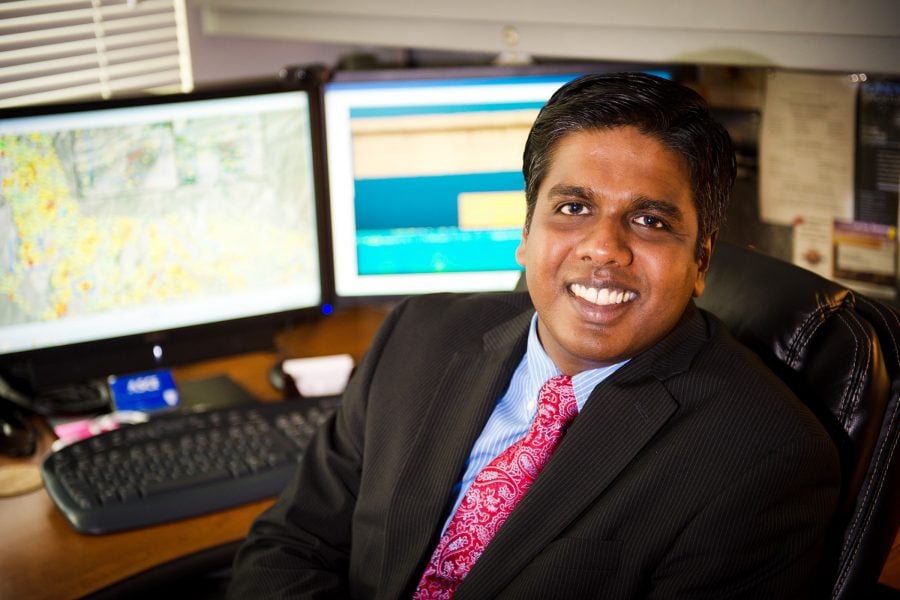by Electrical and Computer Engineering

Nagesh Hatti (ECE) was the lead of a startup team that took first place in a virtual entrepreneurial startup event focusing on Education, held earlier this month. The Techstars StartUp weekend was hosted virtually from São Judas University in São Paulo, Brazil.
Hatti and team pitched “Inter-Self” a mobile-based app that focuses on the emotional health of students, combined with their interaction with fellow students, during projects and assignments.
Hatti said the objective of their idea is to provide a feedback mechanism so instructors are aware of the overall emotional health of students, and then use that as an input to their instruction.
Techstars Startup Weekend, in partnership with Google for Startups, is a 54-hour event created for entrepreneurs of all kinds. “It was an intense but rewarding experience,” Hatti said. “There was a lot of support and encouragement to come up with new ideas and execute on them.”
Hatti said that many of the mentors participating in Techstars startup weekend were successful entrepreneurs who started companies at similar events.

Dr. Timothy Havens presented the lead talk at the Los Alamos National Laboratory’s ISR-2 Seminar Series on Advancing Toward Modern Detection and Estimation Techniques for Multi-Sensor Scenarios, presented online July 9, 2020.
Tim Havens is associate dean for research for the College of Computing, director of the Institute of Computing and Cybersystems (ICC), and the William and Gloria Jackson Associate Professor of Computer Systems.
The talk, “Explainable Deep Fusion,” described Havens’s sensor fusion systems research that seeks to combine cooperative and complementary sources to achieve optimal inference from pooled evidence.
Havens specifically discussed his innovations in non-linear aggregation learning with Choquet integrals and their applications in deep learning and Explainable AI.

College of Computing Assistant Professor Bo Chen, Computer Science, and his graduate students presented two posters at the 41st IEEE Symposium on Security and Privacy, which took place online May 18 to 21, 2020.
Since 1980, the IEEE Symposium on Security and Privacy has been the premier forum for presenting developments in computer security and electronic privacy, and for bringing together researchers and practitioners in the field.
Chen leads the Security and Privacy (SnP) lab at Michigan Tech. He is a member of Michigan Tech’s Institute of Computing and Cybersystems (ICC) Center for Cybersecurity (CyberS).
Chen’s research focuses on applied cryptography and data security and he investigates novel techniques to protect sensitive data in mobile devices/flash storage media and cloud infrastructures. Chen is also interested in designing novel techniques to ensure security and privacy of big data.
Chen will serve as general chair for the First EAI International Conference on Applied Cryptography in Computer and Communications (AC3), which will be held in Xiamen, China, in May 2021.
Visit Bo Chen’s faculty webpage here.
Poster: A Secure Plausibly Deniable System for Mobile Devices against Multi-snapshot Adversaries
Authors: Bo Chen, Niusen Chen
Abstract: Mobile computing devices have been used broadly to store, manage and process critical data. To protect confidentiality of stored data, major mobile operating systems provide full disk encryption, which relies on traditional encryption and requires keeping the decryption keys secret. This however, may not be true as an active attacker may coerce victims for decryption keys. Plausibly deniable encryption (PDE) can defend against such a coercive attacker by disguising the secret keys with decoy keys. Leveraging concept of PDE, various PDE systems have been built for mobile devices. However, a practical PDE system is still missing which can be compatible with mainstream mobile devices and, meanwhile, remains secure when facing a strong multi- snapshot adversary. This work fills this gap by designing the first mobile PDE system against the multi-snapshot adversaries.
Poster: Incorporating Malware Detection into Flash Translation Layer
Authors: Wen Xie, Niusen Chen, Bo Chen
Abstract: OS-level malware may compromise OS and obtain root privilege. Detecting this type of strong malware is challeng- ing, since it can easily hide its intrusion behaviors or even subvert the malware detection software (or malware detector). Having observed that flash storage devices have been used broadly by computing devices today, we propose to move the malware detector to the flash translation layer (FTL), located inside a flash storage device. Due to physical isolation provided by the FTL, the OS-level malware can neither subvert our malware detector, nor hide its access behaviors from our malware detector.
The 41st IEEE Symposium on Security and Privacy was sponsored by the IEEE Computer Society Technical Committee on Security and Privacy in cooperation with the International Association for Cryptologic Research. The Symposium was May 18-20, 2020, and the Security and Privacy Workshops were May 21, 2020.
Members of the Michigan Tech Transportation Institute (MTTI) were active at the

Among the many Michigan Tech students and faculty who attended and presented at the 2020 Transportation Research Board (TRB) Annual Meeting held recently in Washington, DC. was Thomas Oommen (GMES), who gave a lecture on “Remote terrain Strength for Mobility Characterization” at the meeting’s lectern Session 1384: Integration of Remote Sensing Techniques and Classical Instrumentation. Oommen is a member of the ICC’s Center for Data Sciences.
The Transportation Research Board (TRB) 99th Annual Meeting was held January 12–16, 2020, in Washington, D.C. More than 13,000 transportation professionals from around the world were expected to attendd.
The meeting program covered all transportation modes, with more than 5,000 presentations in nearly 800 sessions and workshops, addressing topics of interest to policy makers, administrators, practitioners, researchers, and representatives of government, industry, and academic institutions. A number of sessions and workshops focused on the spotlight theme for the 2020 meeting: A Century of Progress: Foundation for the Future.
A conference paper co-authored by Nathir Rawashdeh (CC/MERET), has been accepted for presentation and publication at the 5th International Conference on Advances in Mechanical Engineering, December 17-19, 2019, in Istanbul, Turkey.
The paper is entitled, “Effect of Camera’s Focal Plane Array Fill Factor on Digital Image Correlation Measurement Accuracy.” Co-authors are Ala L. Hijazi of German Jordanian University, and Christian J. Kähler of Universität der Bundeswehr München.
Robert Pastel (Computer Science/ICC Center for Human Centered Computing), along with Gary Spikberg (MS Industrial Heritage and Archaeology) and Don Lafreniere (SS/GLRC), presented “A Semiautomated approach to Creating Record Linkages and High Resolution Geocoding Across Historical Datasets” at the annual meeting of the Social Science History Association, which took place November 21-24, 2019, in Chicago, IL.
The Social Science History Association is an interdisciplinary organization that publishes a journal, Social Science History, organizes an annual conference, supports graduate student travel to the conference, and awards book prizes. With scholars from history, economics, sociology, demography, anthropology, and other social sciences, the association brings together scholars in thematic networks where they can explore common questions.

